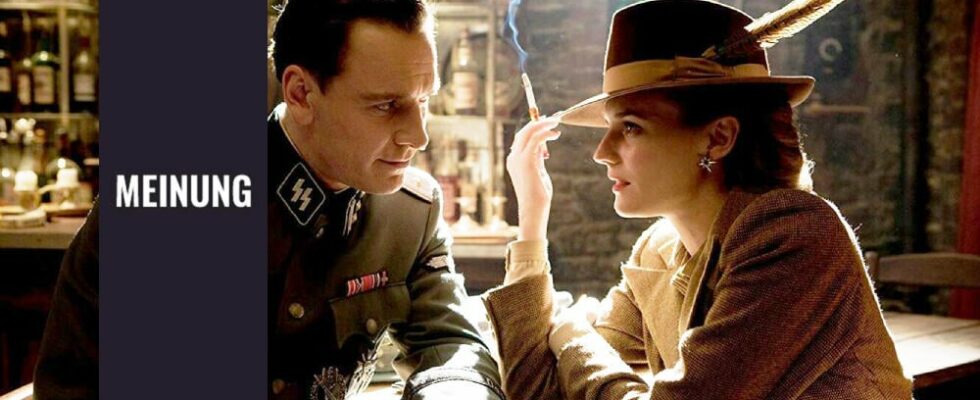Quentin Tarantino made himself immortal with films such as Pulp Fiction, Reservoir Dogs and Kill Bill, establishing his unmistakable style. However, one film was particularly influential in his later work and is also considered one of the best of his entire career: Inglourious Basterds.
In the historical satire, Tarantino jumped further back in history than ever before and gave it a new – and definitely better – course. With this, the cult director established a pattern around 15 years ago that never let go of him in his subsequent films. But let’s take a look at this iconic rewriting of history take a closer look.
In Inglourious Basterds, Quentin Tarantino first wrote the story of
While Quentin Tarantino felt right at home in the present of the 1990s and early 2000s in his earlier works and gave us self-referential, brilliant and tragic stories of gangsters, the cult director set out in his sixth film Inglourious Basterds for the first time with a historical material apart: National Socialism.
In the historical satire, he travels to Nazi-occupied France in 1941, where a plan for revenge against the Third Reich is being developed. A cinema in Paris is to be blown up, where Hitler, Goebbels and co. are attending a German film premiere.
When Inglourious Basterds hit cinemas around the world in 2009, audiences probably didn’t see the film’s ending coming. Not only did many previous Tarantino films end in tragedy for their heroes, but all actual assassination attempts against Hitler in history failed. This made the revelation that the revenge of various people of Jewish origin on the dictator and the highest members of his followers operating in a bloody manner.
Universal
Shosanna (Melanie Laurent) seeks revenge in Inglourious Basterds
The ending of Inglourious Basterds was not planned from the beginning. As Quentin Tarantino explained on the talk show Jimmy Kimmel Live, when he was writing the script he first racked his brains about how he could bring the film to a natural ending. Finally, the idea came to him during a night-time writing session, which he immortalized on a piece of paper: “Just fucking kill him”The next day he decided to actually implement the idea ‒ and thus laid the foundation for his further work.
As the sixth film in Tarantino’s oeuvre, which is known to consist of ten films in total, this change of direction fit right in the middle for the director, like the fortuitous slap in the face that he followed with Django Unchained, The Hateful 8 and Once Upon a Time… in Hollywood.
Django Unchained, The Hateful 8 and Once Upon a Time … in Hollywood followed the example of Inglourious Basterds
In Django Unchained, Tarantino travels back to 1858 and establishes it as “two years before the Civil War”. Since the Civil War actually only started in 1861, the cult director moves the Civil War forward a year and suggests that Django’s (Jamie Foxx) campaign of revenge against various slave traders in the southern states bore fruit and that the fight against slavery could possibly have started earlier thanks to his actions. At the same time, he gives an oppressed minority a fictionalized version of revenge against their oppressors
‒ and thus rewrites history once again in a positive way.
This film changed me: INGLOURIOUS BASTERDS | Quentin Tarantino Rewatch
There are also small but significant historical errors in The Hateful 8, which Tarantino rewrote for his film. For example, Major Marquis Warren (Samuel L. Jackson) and General Sandford Smithers (Bruce Dern) are said to have fought on different sides in the Battle of Baton Rouge, which seems unlikely in the actual history due to Warren’s skin color. For example, black soldiers are said to have only fought in the Civil War from 1863 onwards, while the Battle of Baton Rouge took place in 1862. The film also clearly takes Warren’s side, thus creating another Revenge campaign against social and political injustice.
In Once Upon a Time … in Hollywood, Tarantino travels to Los Angeles in 1969 and investigates the murder of Sharon Tate (Margot Robbie) by the Manson family. Instead of letting this happen, however, Tarantino brings in stuntman Cliff Booth (Brad Pitt), who takes on Charles Manson and his followers and to prevent this and other terrible murdersThis was the fourth time Quentin Tarantino had rewrote history in his films – a pattern that began with Inglourious Basterds 10 years earlier.
It remains exciting to see what story Tarantino will choose for his tenth and final film. After he recently canceled the planned film The Movie Critic, we can probably look forward to another historical subject – which will probably present us with another alternative ending to history.
